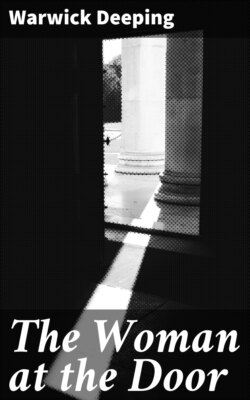Читать книгу The Woman at the Door - Warwick Deeping - Страница 10
На сайте Литреса книга снята с продажи.
2
ОглавлениеTable of Contents
He heard a woman’s voice speaking to the dog.
“Quiet, Peter, quiet.”
Luce was sensitive to voices. His very largeness liked a little, low, gentle voice in a woman, in a world that was full of bright trebles and the silly nasal shrillings of a pinched refinement. The voice in the house had a bird note—a blackbird’s note—and Luce, in his fanciful moments, assigned colour to voices. Some were hard and red, others a flat grey, others canary yellow, but violet voices were rare, and this voice was of that colour.
Apparently she shut the dog into a sitting-room before coming to the door. She hesitated there. She was alone in the house with the dog, though solitude might be blessed.
“Who is it,—please?”
Luce understood her reluctance to unlock the door.
“I’m afraid it’s a stranger, but it’s quite all right. I wondered if you could let me have some milk.”
If he was sensitive to voices, so was she. She unlocked the door and opened it, and he saw before him a little woman dressed in black, one of those dark, pale creatures with pansy eyes. She was all cream and jet as to skin and eyes and hair. In age she might be thirty. But the one thing that struck him about her was her frightened look; not that she was frightened of the immediate occasion, but of life as she was experiencing it. Her pale lips were sensitive and poignant, and there was a suggestion of shadows under her eyes. Moreover, her pallor gave him the impression of coldness, not of the heart, but of the skin.
He smiled at her and raised the jug.
“Please forgive me for bothering you. I have just moved into the old signal tower.”
She stood staring at him like a shy and solemn child, but those darkly lashed eyes of hers were not a child’s eyes. He would have described them as the full, ripe fruit of some unhappy tree of knowledge.
He went on talking.
“I thought I had some tinned milk to go on with. Couldn’t find it. Just like a man. So—tea—was milkless.”
And suddenly she smiled. Her dark eyes remained fixed on his very blue ones. His eyes were like his voice, large and gentle and reassuring to timid creatures.
“You’re at the tower?”
“Yes.—My name is Luce.”
She glanced at the jug.
“Well, yes, I can spare you some.”
“Thank you so much. I suppose you couldn’t let me have a regular supply?”
She looked frightened. Why should she look frightened?
“We don’t—deliver——”
“No. I could fetch it. And perhaps half a dozen eggs now and again?”
She stood hesitant, as though the deciding of so trivial a matter was of strange significance. But why? Had she?—And suddenly she put out a hand and took the jug from him.
“Yes, I think we might. My husband has gone to Melford. Wouldn’t it be—in the morning?”
“At whatever time suits you.”
“About nine o’clock?”
“Yes.”
She disappeared into the passage with the jug, and he heard the dog whimpering. Was this an unhappy house? And then he heard her footsteps returning. Her fingers touched his as she gave him the jug. Her hand was cold.
He thanked her, smiled and turned to go. She stood there watching him, and then—suddenly—she closed the door. Luce, carrying the jug with care, recrossed the paddock to the farm gate, and happening to glance at the trunk of the great beech tree he saw two letters and a device cut in the grey bark, an R and a T with a heart between them. Who was the lover whose knife had cut those symbols? They had been there some years, to judge by the rounded margins. And what did R stand for, a woman, Rose, Ruth or Rachel? And was she—the woman?
He opened the gate and passed through it, and the shadow of the great tree covered him.
